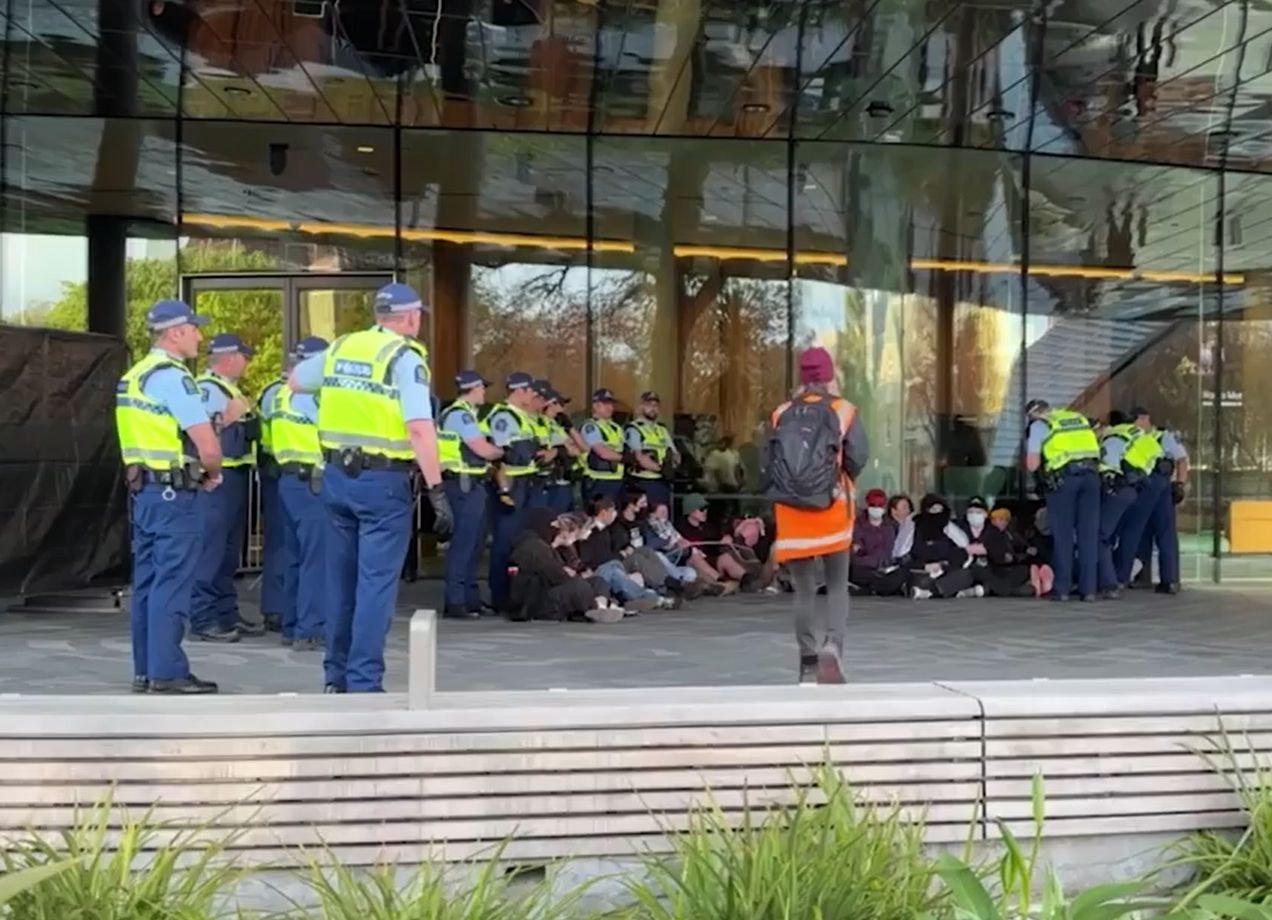
Activists block entrances to Christchurch’s Te Pae Convention Centre; FROM VIDEO by Poppy Clark
By Poppy Clark and Sandra Arambepola,
Published by Stuff, 8 October 2025
Police have made dozens of arrests as protesters tried to stop the National Aerospace Summit at Christchurch’s Te Pae Convention Centre on Wednesday morning.
Protesters alleged rough treatment by police, organisers Peace Action Ōtautahi said.
The group said activists remained outside the convention centre, chanting and maintaining a peaceful presence.
“I moved in towards the convention centre to try and block an entrance, but an officer grabbed me and he started kicking me repeatedly to push me back. He also knocked my glasses off,” one of the activists alleged.
“I was then thrown backwards by a cop over a barrier between the convention centre into a garden where I saw another person lying face down while a cop had one of their arms pinned behind them and kneeling on them,” they alleged, stating that the situation quickly escalated.
Peace Action Ōtautahi spokesperson Joseph Bray said the protesters’ alleged treatment by police “mirrors the very violence inherent in the aerospace industry itself, which is built on militarisation, harm, and destruction”.

Over the course of the day, 37 people were arrested for trespassing, obstruction and breach of conditions, police said on Wednesday evening.
“The role of police is to ensure safety and uphold the law, while recognising the lawful right to protest,” Superintendent Lane Todd, Canterbury Metro Area Commander said.
The protesters said they were opposed to what they claimed were “explicit links between the aerospace industry, the US Military, the Israeli Defence Force, and international weapons companies”.
“It’s an insidious industry, we have weapons manufacturers and foreign militaries operating here under the guise of humanitarian progress and innovation,” Bray claimed.
“Most of us grow up with a sense of awe about rockets, space, and the universe. It’s especially tough to come to terms with the fact that ‘aerospace’ is simply the word militaries and weapons companies use to make their wartime technologies more palatable.”

“It’s critical that the public know just how terrifying the industry really is, that’s why I’m here today,” Davien Gray said.
However, others within the aerospace sector rejected that characterisation.
Dr Isaac Henderson, chair of UAVNZ, the national body for the drone industry, told RNZ that collaboration between civilian and military groups was both normal and beneficial.
“It’s a rather narrow world view,” Henderson said of the protests.
“The drone doesn’t know if it’s being flown for military or civilian purposes, but what good practice and professional operations look like is the same in both contexts.”
He said UAVNZ had a Defence Force liaison officer to “align civilian and military best practice”, and noted that rising geopolitical tensions meant some companies would inevitably supply defence projects.
“But, you know, that’s not all of aerospace,” he added.

Rocket Lab, one of New Zealand’s most high-profile aerospace companies, also pushed back against accusations raised by Peace Action Ōtautahi.
The company said all its launches were approved through a rigorous Government process and complied with national and international law.
“Every satellite launched by Rocket Lab to date has received approval from the New Zealand Government for launch from Mahia,” the company said.
It explained that the payload – what the rocket is launching or delivering – permitting process is conducted independently by the New Zealand Space Agency and approved by the Minister for Space, with multiple agencies consulted.
Rocket Lab said launches must meet strict legal requirements, including demonstrating that payloads are safe, align with New Zealand’s international obligations, do not pose national security risks, and are consistent with the country’s national interests.
The company noted that certain activities are explicitly banned under New Zealand law.
These included payloads linked to nuclear weapons programmes, those intended to harm or interfere with other spacecraft or systems on Earth, or those supporting specific defence or intelligence operations contrary to Government policy.
Payloads likely to cause serious or irreversible environmental harm were also prohibited, Rocket Lab said in a statement.

ALDEN WILLIAMS / The Press
‘New phase for space, advanced aviation sectors’
Speaking at the summit at the convention centre, Space Minister Judith Collins said the country’s space and advanced aviation industries were entering a phase defined by “scale, ambition and global relevance”.
She highlighted that the sectors’ combined revenues had grown significantly, with the space sector increasing 53% to $2.68 billion over the past five years, and the advanced aviation sector reaching an estimated $530 million in 2024.
She noted the industries covered advanced manufacturing, AI and autonomy, earth monitoring, and next-generation mobility, and said the Government was working on regulatory frameworks to support growth and attract international investment.
Collins added that New Zealand was establishing a regulatory sandbox for safe testing, and has passed legislation to deter foreign interference and protect national interests.
“All of this is evidence New Zealand’s space and advanced aviation sectors are no longer emerging, they’re here and they’re accelerating,” she said.
See: Original Article




